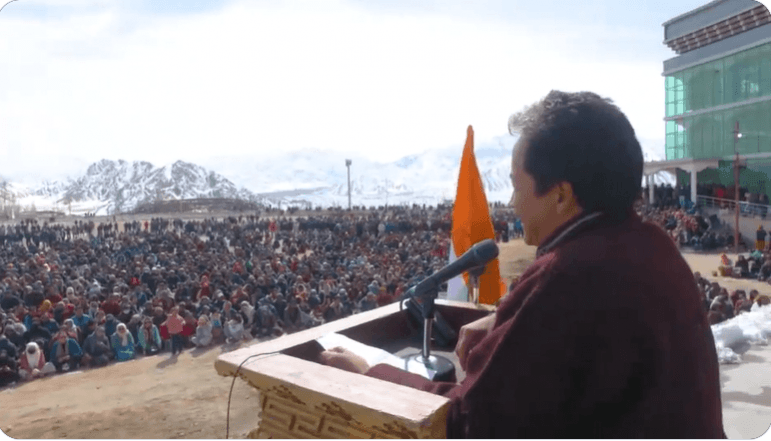
Ladakhi activist and educator Sonam Wangchuck continues his fast, now on its 12th day, advocating for significant changes in Ladakh's political and environmental landscape.
"300 people sleeping outdoors under clear skies with minus 10-degree temperature", Wangchuk said in a video post on his social media account. "Today is a big day. Thousands of people joined for a day climate fast here and in different Indian cities", he said.
"We are trying to remind the Indian government to keep their promises of giving safeguards to the fragile ecology and the unique indigenous tribal culture of this mountainous region", he said.
"Today is a big day for us. We expect thousands of people to join us for a one-day fast in support of this movement or to express solidarity and support to Ladakh and the Himalayas and its fragile ecology", Wangchuck said.
He said that people will not allow the governments to sell off the secret Himalayas to corporate and industrial mining lobbies to plunder and exploit natural resources.
END OF DAY 12 OF #CLIMATEFAST
— Sonam Wangchuk (@Wangchuk66) March 17, 2024
Some 5,000 People gathered here for one day fast today.
And 250 sleeping in the open with me.
Similar fasts were held in many cities in India. Please participate in the twitter storm with #SaveLadakh and share pics from activities in your cities.… pic.twitter.com/3HQ7CWth0c
"Governments will get election funds and corporates will make profits but when disaster strikes it will be the local people that will suffer and it will be taxpayers' money that will be spent to repair that damages", he said, adding, "Corporates make profits and taxpayers money goes into making it right again".
Wangchok asks BJP to fulfill its promise
Wangchok said in 2019, the government not only assured but kept this in the topmost agenda of their election manifesto in the Parliamentary elections and later the hill council elections.
"But there was a deafening silence for months and then it became a crime to even remind them of the promises and finally after four years at the end of their term on March 4, 2024, they declined to keep their promises," he added.
He said the government did not disclose the reason for changing its mind but people here feel that it is perhaps under the pressure of industrial and mining lobbies that are pressuring the government to keep these regions unprotected so that they can exploit the mountains for rich minerals.
"We must understand that Ladakh is on the Tibetan plateau and the entire Himalayas come in the sensitive zone. After the South and the North Pole, this is called the Third Pole and has the largest reservoir of freshwater that feeds roughly 2 billion people, which is about 25% of the planet's population. It is sad to see the government care only about the profits of their industrialist friends. They don't think about future generations," said Wangchuck.

Who is Sonum Wangchuck?
Wangchuck, renowned for his educational initiatives and known as the real-life inspiration behind the character "Phunsukh Wangdu" from the film "3 Idiots," is demanding statehood for Ladakh and constitutional safeguards for its indigenous population under the Sixth Schedule of the Constitution.
Termed "Climate fast" Wangchuck's 21-day fast, potentially extending to death, aims to draw attention not only to Ladakh's political aspirations but also to the urgent need for climate action. He emphasizes the importance of a simpler lifestyle to mitigate carbon emissions, urging people in urban areas to take heed.
Support for Wangchuk's cause is growing, with people from diverse backgrounds joining him in fasting, and he calls for nationwide solidarity through a one-day fast on March 17. Despite harsh conditions, with temperatures dropping to -17 degrees Celsius, Wangchuck remains resolute, updating his progress through social media platforms.
His protest highlights unfulfilled promises by the government, particularly regarding Ladakh's demands outlined in the 2019 election manifesto. Wangchuck's advocacy encompasses not only political representation but also the preservation of Ladakh's unique environment, facing increasing threats from climate change.








